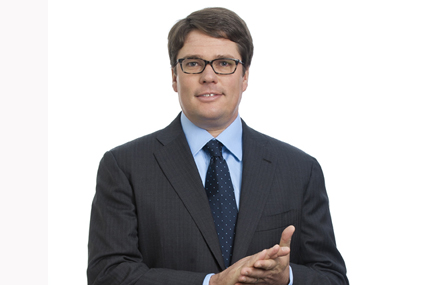Jeff Arnold
Co-founder, chairman and CEO, Sharecare
2007-2009
Chief of global digital strategy, Discovery Communications
2002-2007
Chairman/CEO, HowStuffWorks
1998-2000
Founder/chair/CEO, WebMD
Sharecare cofounder Jeff Arnold didn’t grow up harboring entrepreneurial ambitions.
“I was number five of six kids, so I was always very independent, but I didn’t foresee that I had an entrepreneurial bone in my body,” he says.
Arnold dropped out of the University of Georgia, where he studied speech communication, and worked for a reseller of Merck products in 1993. A doctor he met at the hospital where his girlfriend (now wife) was a nursing intern helped spark the idea for Quality Diagnostic Services, a cardiac arrhythmia monitoring company. Arnold started it with a $25,000 loan from his future father-in-law. Quality Diagnostic Services sold for $25 million in 1998 and Arnold got started on WebMD.
“My experience with QDS led to the realization that healthcare needed a homepage. With WebMD we learned health information is mission critical information that has to be right 100% of the time and that brand matters.”
He then bought HowStuffWorks for about $2 million in 2002 and got “really good at search” before selling it to Discovery Communications for $250 million in 2007.
A meeting with Dr. Mehmet Oz, who wanted build a website, led to Sharecare’s launch in October 2010. More than $40 million has been raised from investors including Oz, Harpo Studios, Sony Pictures Television and Discovery. Galen Partners and TomorrowVentures recently infused $14 million.
“The challenge was how would I do WebMD differently 10 years later,” Arnold says. “It’s a wonderful, credible site but it’s one addressing the many. Healthcare needs to become more personal. Instead of having one WebMD, we need millions of WebMDs. We do this by digitally enabling the individual HCP.”
Sharecare aims to be “the humble host of healthcare,” he says. The site allows consumers to ask questions that are answered by multiple experts. Users can “friend” each other and share content within networks. There are currently more than 200 major partners, almost one million questions and hundreds of thousands of answers.
Experts include healthcare professionals, nonprofits and “knowledge partners,” such as Pfizer, Dove, UnitedHealthcare and Weight Watchers. Revenue comes from knowledge partners, which typically have one-year minimum, multimillion dollar contracts for sponsorship rights to answer questions in a given category, and from $75 per month HCP profile pages.
Though Sharecare hasn’t turned a profit, revenue increased 300% from 2010 to 2011. Staff has grown from 20 to 110, total site visits hit 12.5 million in December and page views topped 100 million in January.
“We could be profitable now but we’re investing every dollar into the technology because we think it’s going to have such a big impact,” he adds.
The strategy is to move consumers from information to action to support. The action piece involves measurable evidence-based programs (available on the site and promoted on Oz’s show) like “Transformation Nation,” developed in partnership with Weight Watchers, which launched in September and has more than one million participants.
“With Quality Diagnostic Services we learned it didn’t matter how good the technology was if you didn’t build the patient relationship because you wouldn’t get compliance and without compliance you wouldn’t get results and without results doctors wouldn’t use you. If Sharecare doesn’t connect with the consumer we’re not going to drive engagement, and if we don’t drive engage we’re not going to get results, and if we don’t get results what’s the point?”
New 2012 offerings will include SharecarePro (providing things like CME, e-detailing and research); a “You, the Smart Patient” video library; and online doctor appointment scheduling. Apps will continue to be developed with partners before APIs are published (expected in 2013), allowing others to develop apps inside the site. The Little Blue Book was acquired as part of the Galen Partners deal. Its more than 400,000 physicians will be listed on Sharecare by the of April (the hope is they’ll convert to paid profile pages).
Arnold doesn’t consider other healthcare sites competitors — sites like Healthwise and Livestrong are on Sharecare, and he thinks WebMD should be too. Moving destination sites into a social mindset can be tough, he says, given IT challenges and advertiser and user expectations, whereas Sharecare has embraced enabling technology upfront.
“The good news for WebMD is it’s a trusted brand — it might take time, but they’ll figure it out,” he says.
As for sites that aggregate multiple health related sites, Arnold views them as basically ad networks. “An ad network isn’t going to be a catalyst to the change healthcare needs or put the accountability into online health that’s necessary to measure that change,” he says.
Notably down-to-earth and personable, Arnold says his dad taught him that while it’s nice to be important, it’s more important to be nice. He’s tried to instill that tenet and the idea that “work doesn’t have to feel like a job” into his four kids.
“You have to feel like you’re making the right choices and having impact—whatever that impact is for you,” he adds. “I don’t need to work, and I don’t feel like I’m working. The convergence of media, technology and healthcare interests me. My creative side loves the media piece. My problem-solving side loves the technology. Healthcare is the feel good side. At the end of the day, healthcare is the meaningful side—it can help a lot of people.”
From the March 01, 2012 Issue of MM+M - Medical Marketing and Media







